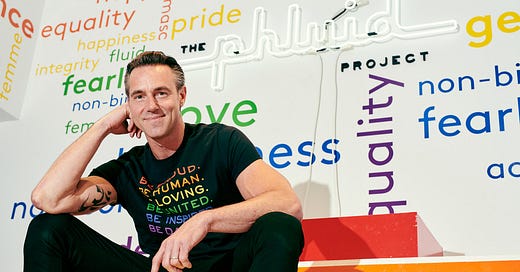The Renegade Fashion Guru Who Wants to Change the Way We Think About Gender
How a former frat boy and high-flying retail exec finally found his calling—by opening America’s first gender-fluid clothing store.

Photos by Vincent Tullo & Kyle Kucharski
One bright day in May, standing near the front door of The Phluid Project, a new, gender-neutral clothing store in Downtown Manhattan, founder Rob Smith greets customers with a warmth on par with the weather. Tall, fit and soap-star handsome with bright eyes, sculpted salt-and-pepper hair and a flawless grin, Smith repeatedly extends his glittery-nail-polish-clad hand, asking prospective buyers their names, how they heard of the place, and what they might be shopping for. The showroom floor behind him is dotted with pink, mustachioed blowup bunnies, gold backpacks, camo pants, and rainbow-lettered tees offering “FREE HUGS.”
Smith, 52, sees The Phluid Project as part retailer, part community space. He exudes immense pride in the business he built himself this past year, after taking out a loan against his retirement savings and pouring $40,000 into the space’s renovation. A 30-year veteran of the commercial retail industry, Smith dreamt up The Phl…
Keep reading with a 7-day free trial
Subscribe to Narratively to keep reading this post and get 7 days of free access to the full post archives.



